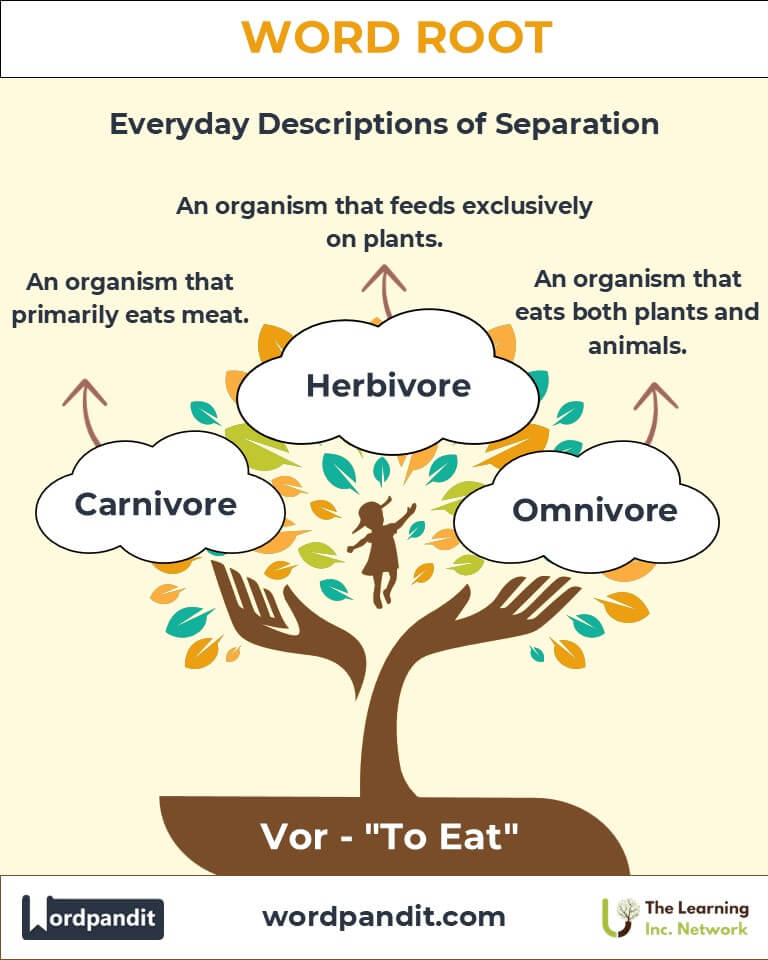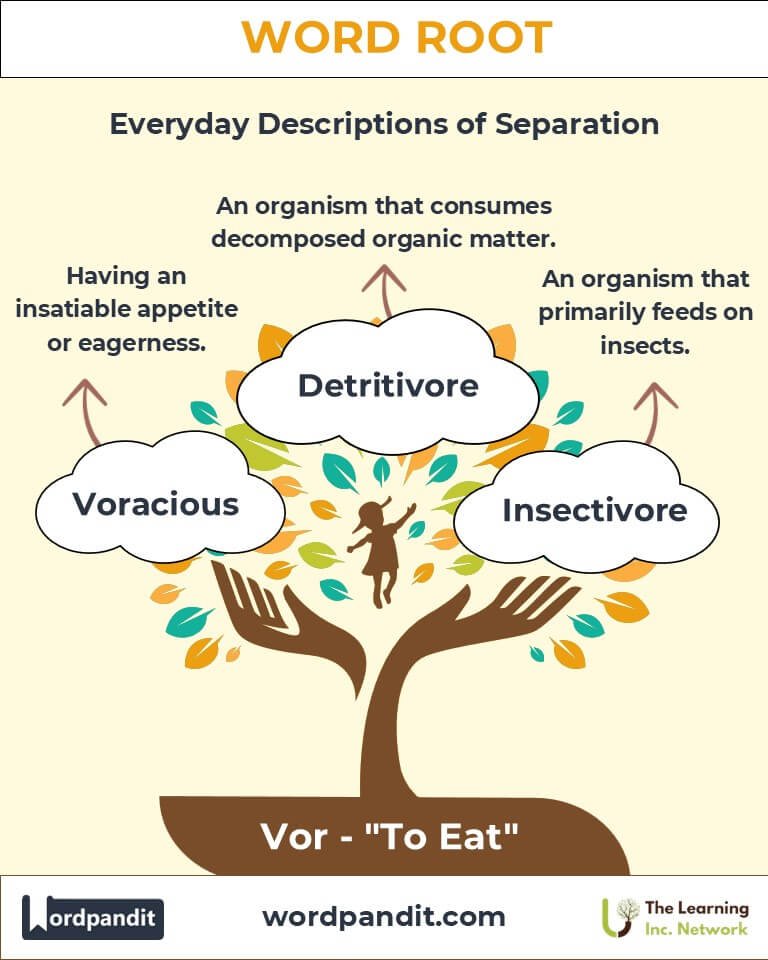Vor: The Root of Appetite and Consumption
Discover the linguistic power of the root "Vor," derived from the Latin word vorare, meaning "to eat" or "devour." From the voracious appetite of a carnivore to the restrained feeding habits of an herbivore, this root has left its imprint on words that describe eating habits and consumption in both literal and metaphorical senses.

Table of Contents
- Introduction: The Essence of Vor
- Etymology and Historical Journey
- Mnemonic: Unlocking the Power of Vor
- Common Vor-Related Terms
- Vor Through Time
- Vor in Specialized Fields
- Illustrative Story: Vor in Action
- Cultural Significance of Vor
- The Vor Family Tree
- FAQs About the Vor Word Root
- Test Your Knowledge: Vor Word Root Quiz
- Conclusion: The Insatiable Influence of Vor
1. Introduction: The Essence of Vor
Have you ever been called voracious after devouring a delicious meal? The word root Vor, pronounced as "vohr," signifies the act of eating or devouring. Originating from Latin, Vor permeates words that describe the eating habits of organisms, from humans to animals, and metaphorically extends to insatiable desires.

2. Etymology and Historical Journey
The root Vor comes from the Latin verb vorare, meaning "to swallow whole" or "to devour." Its earliest uses can be traced back to ancient texts describing mythical creatures and their consuming habits. Over time, the root became part of terms categorizing dietary habits, such as carnivore (meat-eater) and herbivore (plant-eater). With the rise of scientific nomenclature, it found a permanent home in biology and zoology.
3. Mnemonic: Unlocking the Power of Vor
To remember Vor, imagine a vacuum cleaner labeled "VOR" sucking up everything in sight—symbolizing the act of consuming or devouring.
Mnemonic Device: “VOR is the vacuum that devours everything—meat, plants, or ideas!”
4. Common Vor-Related Terms
- Carnivore (kar-nih-vohr)
- Definition: An organism that primarily eats meat.
- Example: "The lion, a carnivore, hunts to sustain itself."
- Herbivore (hur-bih-vohr)
- Definition: An organism that feeds exclusively on plants.
- Example: "Cows, as herbivores, graze in fields."
- Omnivore (om-nih-vohr)
- Definition: An organism that eats both plants and animals.
- Example: "Humans are omnivores, capable of diverse diets."
- Voracious (voh-ray-shuhs)
- Definition: Having an insatiable appetite or eagerness.
- Example: "He was a voracious reader, finishing a book a day."
- Devour (deh-vow-er)
- Definition: To eat greedily or consume destructively.
- Example: "She devoured the pizza in record time."
- Insectivore (in-sek-tih-vohr)
- Definition: An organism that feeds primarily on insects.
- Example: "Frogs are insectivores that help control mosquito populations."
5. Vor Through Time
The evolution of Vor has mirrored humanity's fascination with dietary habits:
- Mythical Voracity: Ancient myths often featured voracious monsters consuming everything in their path.
- Scientific Precision: During the Enlightenment, scientists used Vor to classify organisms by dietary behavior.
- Modern Usage: The term "voracious" expanded metaphorically to describe non-dietary greed or desire, such as "a voracious appetite for knowledge."
6. Vor in Specialized Fields
Vor has found relevance in various disciplines:
- Biology:
- Term: Detritivore
- Application: Refers to organisms like earthworms that consume decomposed organic matter.
- Literature:
- Term: Voracious
- Application: Describes an intense desire for reading or learning.
- Ecology:
- Term: Insectivore
- Application: Helps classify ecological roles in food webs.
- Psychology:
- Term: Voracity
- Application: Symbolizes insatiable emotional or intellectual cravings.
7. Illustrative Story: Vor in Action
In the dense Amazon rainforest, a scientist observed a peculiar battle of appetites. A jaguar, a fearsome carnivore, stalked its prey while a sloth, an herbivore, slowly feasted on leaves. Meanwhile, countless insectivores buzzed through the canopy, consuming pests. Witnessing this intricate food web, the scientist realized how Vor unified these diverse creatures in their constant quest for sustenance.
8. Cultural Significance of Vor
The root Vor resonates in both literal and symbolic domains. Myths about voracious beasts, such as dragons or hydras, illustrate fears of insatiable consumption. In modern culture, phrases like "a voracious reader" or "devouring content" reflect humanity's boundless curiosity and desire for growth.

9. The Vor Family Tree
Explore related roots and their derivatives:
- Carn- (Latin: "flesh")
- Carnal: Relating to the flesh or physical appetites.
- Incarnate: Embodied in flesh.
- Herb- (Latin: "plant")
- Herbal: Related to plants.
- Herbicide: A substance used to kill unwanted plants.
- Omni- (Latin: "all")
- Omnipotent: All-powerful.
- Omniscient: All-knowing.

FAQs About " Vor "
Q: What does the root "vor" mean?
A: The root "vor" comes from the Latin word "vorare," meaning "to eat" or "to devour." It appears in words related to consumption, such as "voracious" (eager to consume large amounts) and "carnivore" (meat-eater).
Q: How is "voracious" connected to "vor"?
A: "Voracious" describes a strong appetite for something, whether food or other activities. It directly ties to "vor," emphasizing eagerness to consume or devour.
Q: What does "carnivore" mean?
A: "Carnivore" combines "carni-" (flesh) and "vor" (to eat), meaning an organism that primarily consumes meat. Examples include lions and tigers.
Q: What is an "omnivore"?
A: An "omnivore" is an organism that eats both plants and animals. The term combines "omni-" (all) and "vor" (to eat), indicating a diverse diet.
Q: Why does "herbivore" contain the root "vor"?
A: "Herbivore" refers to an organism that eats plants. It combines "herbi-" (plants) and "vor" (to eat), emphasizing its plant-based diet.
Test Your Knowledge: " Vor " Mastery Quiz
1. What does the root "Vor" mean?
2. Which term describes a plant-eating organism?
3. What does "voracious" signify?
4. What is an insect-eating organism called?
5. Which word refers to eating all types of food?
10. Conclusion: The Insatiable Influence of Vor
The root Vor embodies the essence of consumption, extending from dietary habits to metaphorical desires. Whether in biology, literature, or daily language, Vor reminds us of the universal need to feed our bodies, minds, and spirits. Explore its legacy and let it fuel your appetite for learning!
Suggested URL: /vor-word-root-meaning-eat














